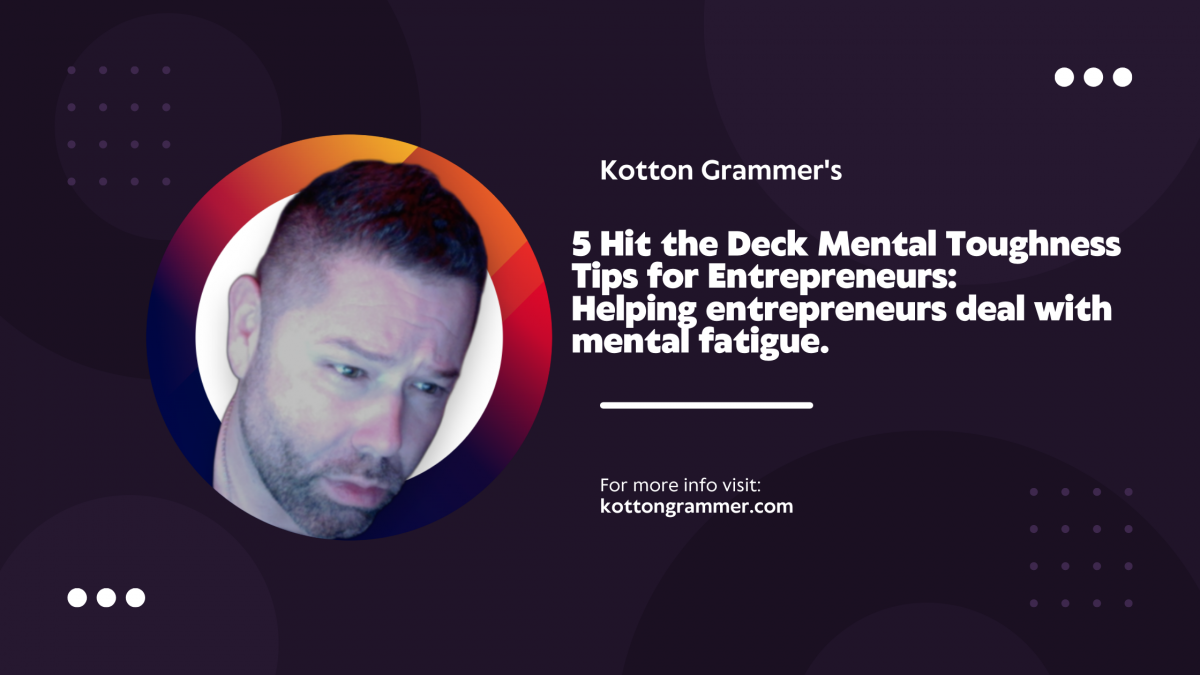Entrepreneur Pro Tip: 5 Hit the Deck Mental Toughness Tips for Entrepreneurs: A blog about helping entrepreneurs deal with mental fatigue.

Introduction
We all have moments where our minds and bodies feel fatigued. Fatigue can come from many different sources, including our physical health, the amount of sleep we've had, the amount of coffee we've consumed, and even what we ate for lunch. It can also arise from a lack of focus on a task that needs to be completed or from a bad experience with a customer or colleague. Mental fatigue is our brains' natural way of letting us know that it needs to rest, regroup and recharge to focus again. Mentally fatigued people often struggle with thinking clearly and making good decisions, and dealing effectively with stressors in their lives. However, many people who are feeling mentally exhausted try to push through it instead of resting or taking time off because they don't want to appear weak or be perceived as giving upon.
There are many ways that entrepreneurs can increase their mental toughness, so they remain focused on their goals despite experiencing setbacks. These tips will help you overcome fatigue and stay strong when times get tough:
1. Know yourself and your limits.
The first step to developing mental toughness is knowing yourself and your team. Know your limits and those of each member of your team. Creating a personal "To Do" list is an excellent way to start this process. Each item on the list should include one of these questions:
-
What are my strengths?
-
What are my weaknesses?
Once you have identified both yourself and others, it's time to take inventory and make adjustments where necessary! If there is an area that needs improvement, focus on addressing those issues head-on!
2. Take a rest break every 90 minutes for at least 10-15 minutes.
As entrepreneurs, we are often obsessed with getting things done and working hard. We see ourselves as workhorses. But this can be detrimental to our success if we do not take care of ourselves.
Take breaks every 90 minutes for at least 10-15 minutes. Use this time to do something relaxing and fun. A great way to do this is by using the Pomodoro technique: set a timer for 25 minutes and focus on one task during that window before taking a 5-minute break (or longer if you need it). This will allow your brain time to rest while also giving you some time off from focusing on one thing so intensely.
Instead of just sitting around being bored, you can also use this time productively by doing something productive in between breaks, like checking email or making phone calls!
3. Set a goal that feels within reach but will also be challenging.
The second tip is to set a goal that feels within reach but will also be challenging. For example, if you just finished your first semester of college and want to write a novel next year, that may be too ambitious. Similarly, if you are at retirement age with no career goals and decide that writing your first book will be your main focus for the next year—that might not be an achievable goal.
An excellent way to formulate this type of goal is by asking yourself: What would I have achieved by now if I had started working ten years ago? Then ask yourself what specific steps need to happen for that success to become a reality today (like "I need a new job" or "I need some kind of training program").
4. Tell others about your goals and ask them to remind you when they think you might be flagging.
You might be wondering why telling others about your goals is so important. The reason is simple: they can help keep you focused and motivated when times get tough. If people know what your goal is, they will be able to remind you of it at the right time. This can help boost when things start to get rough and keep you on track throughout the entire journey.

5. Create a ritual that reminds you of why you are doing what you're doing, the result you want, and how hard it will be to get there.
Create a ritual that reminds you of why you are doing what you're doing, the result you want, and how hard it will be to get there. The last thing you want to do is take on an impossible task without knowing what it will take from your life.
Creating a ritual reminds you of the goals that are important to achieve and will help keep them at the forefront of your mind when things get complicated.
Suppose a goal is so big that it's not quite real yet; talk about it with others. Write down some ideas on paper or in Evernote to have some visibility in your life; this will also help remind them when life gets busy again!
Mental toughness is all about knowing yourself, being honest with yourself, and acting in ways that maximize your resources to meet your goals.
Mental toughness is all about knowing yourself, being honest with yourself, and acting in ways that maximize your resources to meet your goals.
This might sound like a lot of fluff, but it's the key to mental toughness. If you're not honest with yourself about what you want or how much energy (or lack thereof) you have at any given moment, then no amount of willpower or determination can help you achieve your goals.
Conclusion
Kotton Grammer has left you with five tips to help build mental toughness to get things done. The most important thing is to know yourself and understand your mental limits. It is all about taking small breaks every 90 minutes, setting realistic goals that push you without breaking you, and finding a way to keep yourself motivated when things become challenging.
Good luck on your journey!
Kotton Grammer is the founder of Kotton Grammer Media and has trained over 20,000 entrepreneurs on how to start their digital marketing agency, along with having helped thousands of businesses achieve maximum visibility in search engines with organic traffic. His website is https://kottongrammer.com































